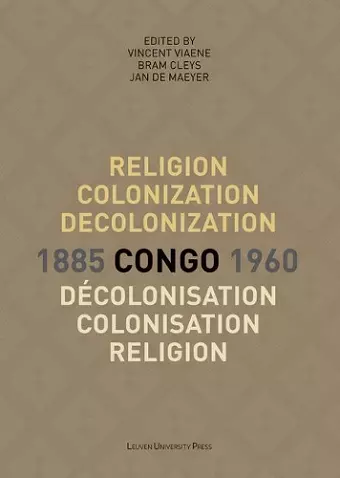Religion, colonization and decolonization in Congo, 1885-1960. Religion, colonisation et decolonisation au Congo, 1885-1960
Jan De Maeyer editor Bram Cleys editor Vincent Viaene editor
Format:Paperback
Publisher:Leuven University Press
Published:22nd Oct '20
Currently unavailable, and unfortunately no date known when it will be back

Religion in today's Democratic Republic of Congo has many faces: from the overflowing seminaries, the Marian shrines of the Catholic Church, the Islamic brotherhoods, and the Jewish community of Lubumbashi, to the 'African' churches of the Congolese diaspora in Brussels and Paris, the healers of Kimbanguism, the televangelism of the booming Pentecostalist churches in the great cities, the Orthodox communities of Kasai, and the 'invisible' Mai Mai warriors in the brousse of Kivu. During the colonial period religion was no less central to people's lives than it is today. More surprisingly, behind the seemingly smooth facade of missions linked closely to imperial power, also then faith and worship were marked by diversity and dynamism, tying the Congo into broader African and global movements. The contributions in this book provide insight into the multifaceted history of the interaction between religion and colonization. The authors focus on the institutional (including legal) political framework, examine the complex interaction between indigenous and 'imported' non-African religious beliefs and practices, and zoom in on the part religions played in the independence movement as well as on their reaction to independence itself. Contributors: Piet Clement (Bank of International Settlements), Bram Cleys (Vrije Universiteit Brussel), Anne Cornet (Royal Museum for Central Africa, Tervuren) Marie Dunkerley (Exeter University), Zana Aziza Etambala (Royal Museum for Central Africa, Tervuren), Anne-Sophie Gijs (Universit Catholique de Louvain), Miguel Bandeira Jer nimo (University of Coimbra), Emery Kalema Masua (University of the Witwatersrand), Sindani E. Kiangu (Universit de Kinshasa), Elisabeth Mudimbe-Boyi (Stanford University) Dominic Pistor (Simon Fraser University), Jean-Luc Vellut (Universit Catholique de Louvain), Vincent Viaene
[...] a worthwhile contribution to scholarship on Congo [...] hopefully it should help stimulate new research in twentieth- and twenty-first-century Congolese religious history.David Maxwell, The English Historical Review, 2022, ceac253, https://doi.org/10.1093/ehr/ceac253
Its three sections proceed, as the editors explain, from the political to the socio-cultural and personal order, yet, each section exemplifies the deep entanglements of these domains. The authors aim to put religious agency at centre stage, focusing on the cultural interface created by the missionary encounter. This approach highlights both the interplay between objectives and interests of consecutive colonial administrations, policies of Protestant and Catholic missionary organisations, practices of missionaries on the ground and mediation and appropriations by their converts: African Christians who became key players in carving out multiple meanings of religion in Congo.Marit Monteiro, SZRKG/RSHRC/RSSRC, 116 (2022), 403–506, DOI: 10.24894/2673-3641.00127
The book is engaging, enjoyable, and a high-quality product, with all chapters well written and capably edited. Students of the colonial encounter, and in particular of missionary action in Congo, will find rich references and numerous suggested avenues for future research.
Matthew G. Stanard, TSEG, VOL. 18, NO. 2, 2021, https://tseg.nl/article/view/10788/12072, DOI: 10.52024/tseg10788
L’ année 2010 est marquée par la commémoration du cinquantenaire de l’ indépendance de la République du Congo. Parmi les très nombreuses manifestations scientifiques qui prennent alors place, le KADOC organise un colloque international intitulé ‘Religion, Colonization and Decolonization in Congo 1885-1960’. Celui-ci réunit une trentaine d’intervenants, historiens et hommes d’Église surtout, dont la plupart proviennent de Belgique, de la République démocratique du Congo ou des États-Unis. Les actes de cette rencontre internationale paraissent dix ans plus tard sous le titre bilingue ‘Religion, Colonization and Decolonization in Congo 1885-1960. Religion, colonisation et décolonisation au Congo, 1885-1960.’ Bérengère PIRET, Tijdschrift voor Nieuwste Geschiedenis, LI, 2021, 3
Hiermee zijn een aantal aspecten uit de geschiedenis van Congo aangesneden, maar die toch ook wel doen verlangen naar een nieuw standaardwerk over de rol van missionarissen en kerken vanaf de 19e eeuw tot de huidige Democratische Republiek Congo. Hoe de verschillende congregaties en ordes te werk gingen in de hun toegewezen gebieden, hoe de verhoudingen met de staatsinstellingen verliepen, hoe zich geleidelijk aan een inlandse clerus en kerk ontwikkelde, en welke rol de verschillende (christelijke) kerken en andere geloofsgemeenschappen vandaag spelen in dit onmetelijke land. Dekolonisatie betekent niet dat men eenvoudig weg de geschiedenis achter zich kan laten. Integendeel. De spanningsvelden die er in de huidige RDC zijn hebben hun historische wortels. Dit soort werken, zoals de bundel die nu voorligt, kunnen er toe bijdragen om niet alleen de politieke of sociale geschiedenis van het land te beschrijven, maar ook aandacht te hebben voor de belangrijke rol van religies, onder welke vorm dan ook.Herman Lodewyckx, Acta Comparanda, 2021
Al vanaf de eerste bladzijde van de inleiding poneren zij immers dat ze vooral de verscheidenheid van de religieuze ervaringen ten tijde van kolonisatie en dekolonisatie tot hun recht willen laten komen. Daarmee nemen ze expliciet afstand van de te eenzijdige focus op missionering die de religieuze geschiedenis van koloniaal Congo tot dan had beheerst. Religie was er veel méér, zo betogen ze, dan de pogingen van katholieke (en in snel verminderende mate ook protestantse) missionarissen om hun geloof aan de Congolese bevolking op te dringen. [...] Dat deze verscheidenheid door de samenstellers van dit boek in de schijnwerpers wordt geplaatst, is vanzelfsprekend positief. Zoals ze het zelf verwoorden in hun inleiding: “The picture is one of vivid colours. It is not yet high definition, but it is no longer monochrome.”
Marnix Beyen, Volkskunde 2021 - 1
ISBN: 9789462701427
Dimensions: 238mm x 170mm x 21mm
Weight: 680g
336 pages